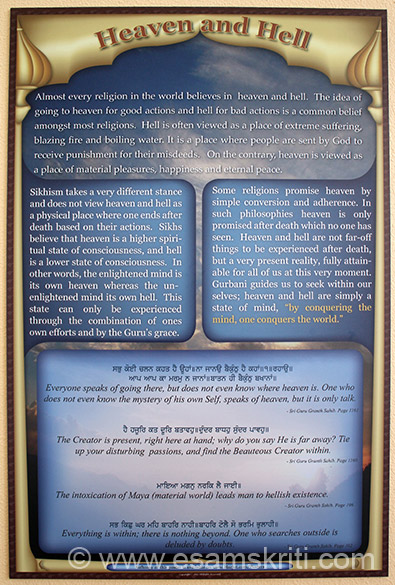HEAVEN AND HELL

Unlike Christianity and Islam, in Sanatan Dharma the concept of Heaven and Hell is not very gripping and neither heaven nor hell is eternal. Moksha or final merging with the Divine is the ultimate goal of life. What is believed is that after death the jeevatma, the individual soul, makes its way through various realms and according to its acts on the physical plane, the soul, which carries the imprint of these actions is purified by either suffering or enjoyment.
After this the purified soul irrespective of whether evil or good rests in the Paramatma until it finds a suitable womb to come back and work out the residual Karma. Depending on the backlog of Karma the soul can take longer or shorter time to return again and again. Sanatan Dharma advocates release from this cycle of birth and death as the ultimate goal. This release can take place by following various paths.
punarapi jananam punarapi maranam
punarapi jananii jathare shayanam
iha samsaare bahudustaare
kripayaa apaare paahi muraare
Born again, death again, birth again to stay in the mother's womb! It is indeed hard to cross this boundless ocean of samsara. Oh Murari! Redeem me through Thy mercy.
Adi Shankaracharya in Bhaja Govindam
Also read
1. FAQ Karma and Reincarnation
2. Acharya Shankara - Delineator of India
3. The Unbreakabke Hindu Sikh bond
About the Author
The author is a writer and practitioner of yog sadhana. Introduced to Yoga in 1972 the author has been teaching a combination of Hatha Yoga and Kundalini Kriya Yoga since 1999. Her understanding of both the Sanatan Dharma and the Sikh scriptures stem from her close association with the simple daily practitioners of both and not through intellectual deliberations.
She is also the author of a book titled 'One Master one disciple' A Thrilling Spiritual Adventure published by Yogi Impressions. She is nurtured and gains strength from the radiant energy of an old tree, ancient masters and yogis appear to her by a lakeside and her daily existence is filled with paranormal experiences. The book is a reminder of the ancient tradition of faithful integrity that every disciple has to the Master.